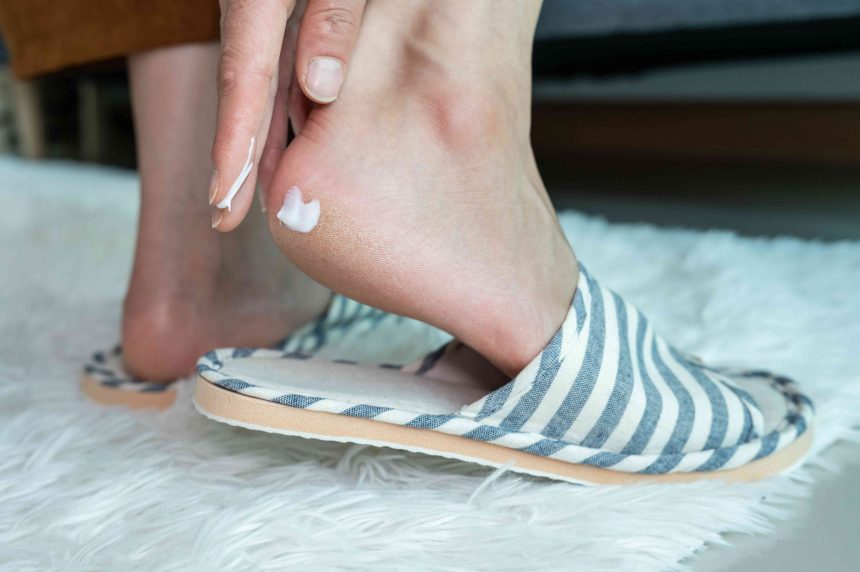Dry feet can occur when your skin loses large amounts of water and oil. The dryness may affect the entire foot, including the soles and heels.
Anyone can develop dry feet. They’re more common during the winter due to the colder, drier air. Some health conditions may also cause dry skin on the feet. Eczema and psoriasis can cause dry skin on the feet and elsewhere on the body. People with diabetes also commonly get dry feet.
Dry skin isn’t always a cause for concern, but you may want to reach out to a healthcare provider if your dry skin itches, if it’s keeping you from sleeping, or if you have open cuts when you scratch your dry feet.
Dry feet can feel different for each person, depending on the cause. In general, the skin on your feet may feel rough, tight, and hard at times. Some people describe it as feeling scale-like.
Dry feet can also come with other symptoms, like flaking or peeling skin, itching, and cracks in the skin that may bleed. These symptoms can happen all over your feet, including the tops, sides, soles, heels, and between your toes.
Dry feet can vary in intensity and duration. Dry feet from dry winter weather will likely be dry for a short period, until you treat it or the weather changes. If your dry feet are associated with a condition like diabetes, psoriasis, or eczema, your skin dryness may be more chronic (long-lasting).
Environmental factors, as well as various health conditions, can cause dry feet. Some factors that can lead to dry feet include:
Dry Air
Places with winter weather or desert environments have drier air, which is one of the major causes of dry feet—and dry skin in general.
At-home heaters and furnaces also contribute to dry air. With less humidity in the air, it’s more challenging for skin to retain moisture, leading to dry and itchy skin. This skin dryness can affect your whole body, including your feet.
Diabetes
Diabetes is a chronic condition in which a person’s blood sugar levels are too high. High blood sugar can damage the blood vessels in the feet over time, causing impaired blood flow and nerve damage. The lack of blood flow can cause dry feet.
The nerve damage can also cause you to lose sensation in your feet, putting you at risk for other foot health concerns like cracks, blisters, or sores. If you have diabetes, it’s important to examine and take care of your feet daily.
Eczema and Psoriasis
Eczema and psoriasis are chronic skin conditions that cause skin redness, irritation, and itch due to abnormal or overactive immune responses.
Both eczema and psoriasis can cause dry patches of skin throughout the body, including on the feet. Certain factors, including dry conditions caused by winter air or dry climate, can trigger psoriasis and eczema attacks or worsen flares.
Other Causes
Dry feet may also be due to:
- Aging: As you get older, skin becomes thinner and produces less of the natural oils that sustain its moisture.
- Athletes foot: This fungal infection can cause itch and dryness, especially between your toes.
- Bathing: Using harsh, drying soaps and detergents or taking long, hot baths or showers too frequently can dry out your skin.
- Medication: Some medications can cause dry feet as a side effect.
While many cases of dry feet aren’t serious, there are certain reasons to talk to your healthcare provider about your dry feet. Reach out to your healthcare provider if:
- Your feet are itchy without a visible rash
- The dryness and itching are uncomfortable enough that they keep you from sleeping
- You see open cuts or sores on your feet
- You see redness or swelling
- You frequently feel tingling, burning, or pain in your feet
These symptoms might be signs of something more serious. A healthcare provider can perform a physical examination to evaluate your dry feet. They might also refer you to a podiatrist (a specialist in conditions of the feet) or a dermatologist (a specialist in skin and hair conditions) for additional testing.
Typical treatments for dry feet include at-home remedies and over-the-counter (OTC) medications to add moisture to the skin of the foot and help control other symptoms, like itch and irritation. Some common treatments include:
- Ceramide moisturizers, applied two or three times a day
- Petroleum jelly
- OTC hydrocortisone creams or lotions
- Antihistamines that help manage skin inflammation
You can also apply a moisturizer and cool compress to help with any itchiness your dry feet could be causing.
If you have dry feet because of a health condition, work with your healthcare provider to treat or manage the root cause, which may help decrease your experience with dry feet and other symptoms.
A few strategies can help prevent dry feet. The following may help you keep your feet moisturized and comfortable:
- Avoid skincare products, including soaps and detergents, with strong fragrances, dyes, or alcohol
- Take short (5-10 minutes) baths or showers once a day in lukewarm water; avoid hot water
- Moisturize within five minutes after bathing to help lock in the moisture
- Avoid wearing shoes that are too tight
- Apply petroleum jelly to your feet before bed
- Stay hydrated with plenty of water
- Use an air humidifier, especially during the winter or when you have the heat on
- Avoid dry and arid environments
Dry feet develop when your feet lose moisture. You may also have other symptoms, including itchy skin, irritation, and cracks in the skin. Dry feet can be caused by dry winter air or medical conditions like diabetes, psoriasis, and eczema.
Mild cases of dry feet can be treated at home with moisturizers, medications like hydrocortisone, and lifestyle strategies like avoiding hot water in the shower. Your healthcare provider may recommend further evaluation or treatment if your symptoms are more severe.








